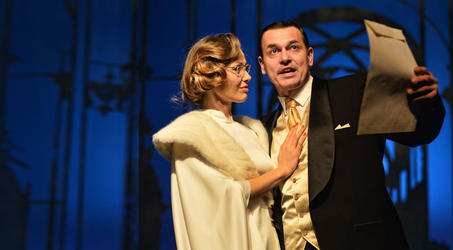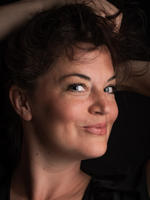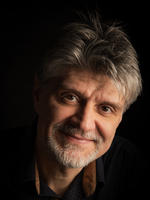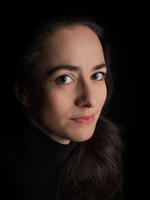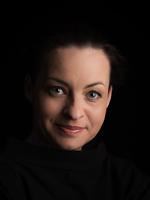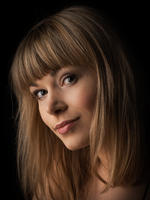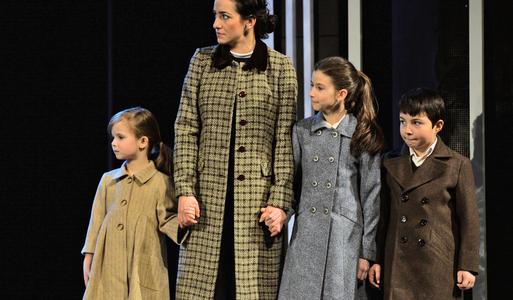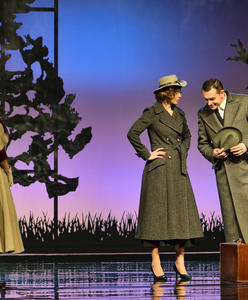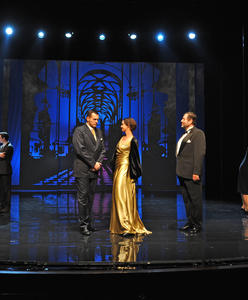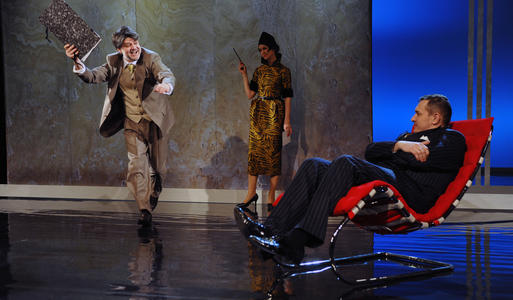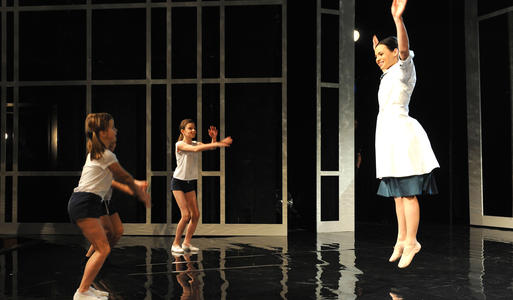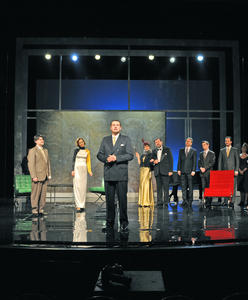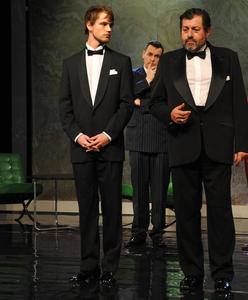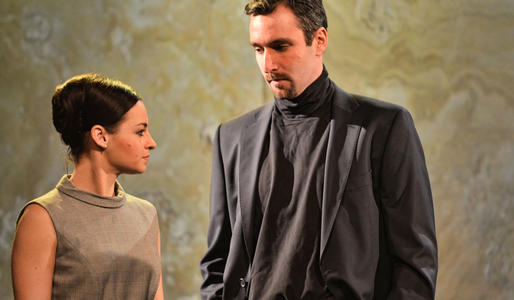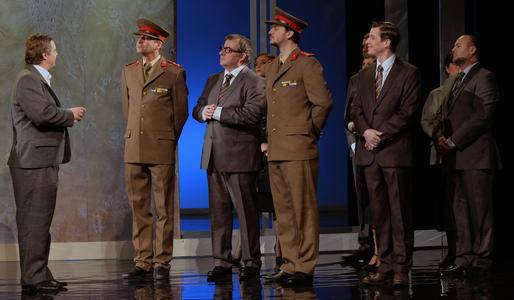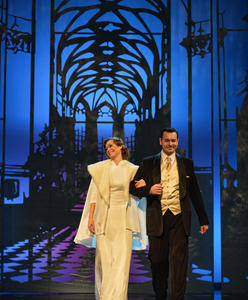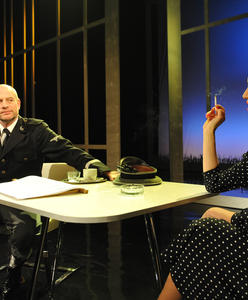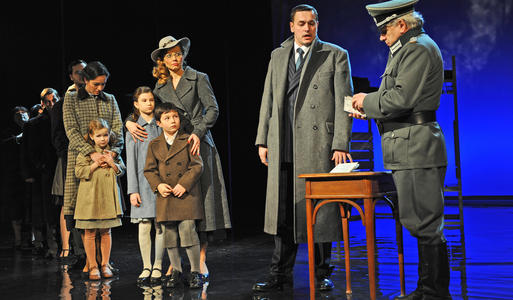TUGENDHAT AS A GLASS ROOM OF THE WORLD
Luboš Mareček 29. September 2015 zdroj Lidové noviny
(…) Just like Mawer, Director Moša wants to tell some kind of generally valid story about the search for happiness, love and one’s place on earth in times when the destinies of people were determined by unfortunate and dramatic events. (...) The story evolves primarily around a married couple, the Landauers, who were played by Petr Štěpán and Pavla Vitázková. With robust, well thought out acting, Štěpán creates a portrait of a good-natured, professionally capable man who is wavering between two women. His Landauer is obsessed with the desire for love, and he is also a pragmatic man who can predict the unfavourable development of historic events. Pavla Vitázková got the big role of Liesel Landauer. The actress has charm, and presents a convincing image of a well-situated lady who longs for the love of those closest to her rather than for a great house. Svetlana Janotová plays her Katalina as a girl who works as prostitute in order to be able to feed her child but also longs for happiness and love, just like the people from the higher levels of society (...) The production of The Glass Room in Brno functions as a historical saga with several love triangles as well as a general representation of the unpredictable faces of love and the twists and turns of history. Its anonymous but easily identifiable Brno setting provides added value for the audience.
A “GLASS DREAM” CAME TO LIFE ON STAGE
Vít Závodský 20. April 2015 zdroj Týdeník Rozhlas
British biologist and writer Simon Mawer has a close professional and personal relationship with the Moravian metropolis (which is partly thanks to the geneticist Gregor Mendel). It was therefore only a matter of time before a stage adaptation of the bestselling novel The Glass Room (2009) appeared at Brno City Theatre. It was created by the theatre’s director, Stanislav Moša, who made use of the swift translation by Lukáš Novák in order to be able to present the work as a world premiere in the presence of the satisfied author.
The initial local inspiration was the internationally famous functionalist Villa Tugendhat, designed for a rich industrialist by avant-garde architect Mies van der Rohe. The unhappy fate of the rationalistically designed villa was fleshed out to create a fictitious story about its inhabitants (bringing protests from the Tugendhats) – the factory-owning Landauer family, and their friends. Moša showed great skill when dramatizing the novel, though he also made some space for his own interpretation of certain aspects while maintaining all essential facts. He follows the complexly interlinked life stories of the wide range of characters in connection with the world events of that time (the onset of Nazism with the racial persecution of Jews, the period of post-February totalitarianism, the arrival of the Prague Spring) in our country as well as in many foreign locations from the end of the 1920s (with the jovial architect von Abt played by Rastislav Gajdoš) up until the beginning of the Soviet occupation in 1968.
Using sharp cuts, Moša has divided up the almost three-and-a-half hour long evening with a circular composition into fifty-five short sequences modelled by light which work with the storyline as well as symbolic contrasts and simultaneity; while the first half of the performance develops dynamically with some conversations and situations providing ironic double meanings, in the second half the attention of the spectators is sometimes lost due to the necessity to “refer back” to the plot or to memories.
Tried-and-tested scenographer Christoph Weyers mastered the impressive evocation of the magical living space and its luxurious furnishings by enabling the swift alternation of many destinations using the Japanese technique of origami to depict them in the form of silhouettes. Andrea Kučerová´s costumes worked excellently with the numerous lightning-speed costume changes. The majority of actors play several characters. The well individualized characters in the tolerantly changeable polygon (Pavla Vitázková, Petr Štěpán, Ivana Vaňková and Svetlana Janotová) find their opposite in the repellent plebeian chameleon Laník, played by recent Thalia Award winner Michal Isteník. The genius loci of the exceptional structure and the melodramatic tinge of the life of its inhabitants have been transformed into a well-balanced and profiled production at Brno City Theatre.
BRNO’S WORLD PREMIERE THAT’S BASED ON A BEST-SELLING BOOK
Peter Stoličný 16. February 2015 zdroj www.i-divadlo.cz
The Glass Room, a novel by British writer Simon Mawer, takes place in Brno between 1925 and 1968. It is based on the story of people connected with the famous Villa Tugendhat, which was designed by the world-famous architect Ludwig Mies van der Rohe.
The interwar period saw an economic boom in Czechoslovakia, despite the necessity for the young state to overcome various obstacles. Industry was developing successfully in Brno. The city’s weaving, engine-manufacturing and arms entrepreneurs initiated the construction of many buildings and several famous architects got involved. Brno, a city of many nationalities where Czechs and Moravians, Germans and Slovaks lived peacefully side by side, was going through a happy time. Textile magnate Tugendhat and his wife, a young married couple, have a famous architect build a villa of unprecedented style, a glazed modern building that contains a wall made of onyx - a semi-precious stone. The cream of the crop of young entrepreneurs and artists meet here at what is simply a happy place for happy people. Such was reality as portrayed in the opening chapters of the British novel. This is also how the production starts at Brno City Theatre, where the play The Glass Room had its premiere.
I carried out a small survey among the university students whom I teach. 75 per cent of those asked knew about the existence of the Brno villa but only 6% knew any details about how the villa was built and what the fates of those connected with it were. It is very probable that a survey held in the streets of Brno would have a similar result. We have a historic architectural treasure and a great story here, but so far we haven´t managed make this villa and this story become a real cultural part of Brno. It took a British writer to do this for us, and now Brno City Theatre has done it too, with a play dramatized and directed by Stanislav Moša.
The novel The Glass Room was translated by Lukáš Novák and published by the Kniha Zlín publishing house in Zlín in 2009. I bought the novel before the premiere in the foyer of the theatre and so I have only managed to flick through the 460 pages. I learned from the press conference that all of the novel’s key moments are present in the play, and according to the author (who was at the premiere and spoke to the spectators after a long round of applause), it is an exceptionally good production which interprets the novel truthfully. Mawer´s story is a work of fiction. While The Glass Room with its onyx wall is the interior of Villa Tugendhat, it isn’t the textile factory owner Tugendhat that lives there but one Viktor Landauer, the owner of a car factory. Tugendhat’s marriage and seven-year stay in the villa was apparently harmonious, but the author of the novel added a lover to the tale – a Viennese dressmaker – and brought drama to the lives of those involved. The dressmaker finally becomes a nanny for the Landauers´ children and she attempts emigration to escape Nazism together with them. What are really truthfully recorded, both in the novel and in the theatre version, are the historic events which ruthlessly threaten the protagonists. As the author of the novel says himself, it was originally mainly meant to be a novel about the genius loci of the villa, the glass room with its view of the city. However, everything developed in a slightly different way, becoming a novel that is primarily about people, about life stories affected by the war and the post-war new order in Central Europe, and again about people – their loves, and the meetings and failures which affect their lives.
In his conception for the play, director and dramatizer Stanislav Moša puts the emphasis on the behaviour of people in connection with the events which take place before World War II and after it in Central Europe, i.e. also in the city of Mesto, in the glass room. The approach of Nazism, which the hostess simply doesn´t want to believe is happening, the crazed experiments of a German soldier and scientist who is trying to prove the inferiority of the Jewish race through measurement of the human head, the rampaging of the Russian liberators who cannot imagine in their primitiveness that the glass room was ever used for living in. And there are also the people. There’s the almost romantic, married couple, the Landauers, who are beside themselves with happiness - yet the car factory owner has a lover in Vienna. Hana Hanáková, a mundane rich man’s wife, is secretly and later openly in love with Liesel Landauer. There is a Moravian boor, who as the caretaker is just as happy to serve the rich Jewish family as he is the Nazis as well as the Russian occupants. He gives the Nazi salute with pretended fervour, and gives the communist greeting “Honour to work!” with the same enthusiasm. Most of all though, he cunningly works to feather his own nest. However, love influences human fates just as much as historical events. Love between lovers, lesbian love, love that is primitively brutal and stupid… well, and then there is also the simple satisfying of needs, as when the German officer has sex. It is interesting that we don´t meet hatred in the story. Yes, there is the mercilessness of fate, but hatred, which such hard times could easily create, isn´t found here. This is perhaps a key attitude of the authors...
The production identifies itself more with Brno’s Villa Tugendhat than the novel does. The onyx wall and the red armchair, the piano, the furniture from Villa Tugendhat – they are all present, as is the view of the greenery in the garden, and of Brno. Add to this the realistic manner with which the actors portray their characters and one almost feels that every single thing seen on stage really happened, and that the creators of the play have simply brought the glass room and the people who live there to life. The documentary style of the novel as well as the production certainly has a share in producing this feeling, but it is mainly down to the sober and utterly believable acting. The director hasn’t attempted to forcibly “liven things up” or commit some of those production excesses that can often be seen in modern shows. There’s no symbolism to be found, no magic tricks with space. Moša simply “just” sticks to the truth in the production. He is helped in this by Christoph Weyers’ functional set and Andrea Kučerová´s costumes – by the way, the women´s clothing in the style fashionable in the pre-war period is beautifully designed – and also musical composer Zdenek Merta made a great contribution to the atmosphere with his impressive sonic background to the production. We also mustn´t forget the lighting design by David Kachlíř or Petr Hloušek´s projections. Several ideas, e.g. the creation of the drawing of the villa by the architect right in front of the spectators´ eyes, certainly deserved applause.
There doesn’t seem to be any acting going on in this play. Everything is truthful, believable. Strong internal motifs as well as silence are used – silence in the glass room is very meaningful. Just as in the ancient dramas, the characters are influenced by fate. Sometimes they don´t know how to fight back, finding themselves in traps from which there is no escape. The only difference is that the works of ancient times are characterised by great gestures and expressive acting, while here the characters are portrayed in an almost minimalist fashion. “Unhappiness doesn´t have to scream,” as Mr. Stanislavski emphasized. In the glass room, we are the witnesses of silent but thus deeper and more life-affecting emotion. Petr Štěpán and Pavla Vitázková as the Landauers are a happy couple that have to come to terms with male infidelity. On top of that, when an innocent prostitute from Vienna (Svetlana Janotová) enters their emigrant lives, their coexistence becomes more complicated. How should one play a girl who fights against a hostile world using her female wiles yet remains almost innocent at the same time? It is truly admirable how Janotová plays her role with such subtle nuances. And what about her relationship with Mrs. Landauer, a woman who was unprepared for coping with life in the disgusting period of anti-Semitism, or with her husband´s infidelity? Her feelings, her helplessness and dignity, are also portrayed commendably. In contrast, Petr Štěpán´s role as Mr. Landauer isn´t one of the most rewarding to be had. He’s a rich man who loves both his family and his lover from Vienna, and so rather an everyday kind of person. However, Štěpán managed to give the character some kind of rich internal life. There’s the responsibility with which he planned the whole emigration process, and the helplessness which hits him when the Nazis appear right in the train and take his lover and the governess of his children away from him. Michal Isteník played his role of the caretaker, a man who “knows how things are”, wonderfully. His Laník is an experienced speculator, bumpkin and primitive, but also a person who can adapt to any period. Radka Coufalová plays a rehabilitation nurse who manages to liven up the area in front of the onyx wall in the glass room with her dancing, which she is asked to perform by Hana Hanáková. It is a beautiful, emotional situation which further emphasizes the magic of the room. And what about Ivana Vaňková as Hanáková? She’s a woman from high society who has always managed to enjoy herself, but when she is raped by German scientist and officer Stahl, she loses control over the delicate balancing act she’s trying to maintain. She is a complicated character, truthfully portrayed. Igor Ondříček plays the fanatical German scientist convincingly, firmly believing that his way is the right one and that humanism will never find a place in his life. The architect Reiner von Abt, played by Rastislav Gajdoš, is another example of playing with space. He hardly is a person at all - he is space. A genius of simplicity and unrestrained action, it’s no wonder he admires the architect Loos, who once uttered the memorable sentence that ornament is a crime.
“There are no big roles, there are only big actors,” if I may paraphrase some classic words. This is roughly how all the characters in this strange documentary production can be evaluated. Truthfulness comes to the surface as a key element of this play. This was of course director Stanislav Moša’s intention, and it has brought great success.
IN THE MAIN ROLE:TUGENDHAT. A WORLD PREMIERE IN BRNO
Jaroslav Štěpaník 16. February 2015 zdroj www.literarky.cz
It’s possible to see quite a few world premieres on the Czech theatre scene - if you consider the first performance of any new play to be such a thing. Only a great narcissist or practical joker announces his or her work as a world premiere, as the probability that the world will learn about it and theatres across the planet will add it to their repertoire is very small. However, this dramatization of a successful novel by Simon Mawer, The Glass Room, performed under the same name at Brno City Theatre’s Drama Theatre on 7th February, rightly bears the title of world premiere. It was of course a successful and excellent premiere.
The book was published in 2009, since when it has been nominated for the prestigious anglophone Man Booker Prize and translated many times. In 2014, the director of Brno City Theatre, Stanislav Moša, who is the author as well as the director of the new play, obtained the rights to dramatize it. Naturally, the premiere was looked forward to with great interest and excitement – and not only for that reason. The main actor as well as the setting of the story is the famous Villa Tugendhat in Brno. S. Mawer, an Englishman who has been living in Italy with his family for a long time, is originally a biologist by profession. He could hardly miss the opportunity to visit Brno, a place connected with the life and work of the founder of genetics, Gregor Mendel. It isn´t certain whether or not he already had the idea for a novel when he came here but one thing is sure - his Mendel´s Dwarf was published in 1997 and made the author a world-famous prose writer.
Brno, a city which underwent rapid development in the 19th century and which was previously unknown to Mawer, gradually became close to the writer’s heart. He later said: “It is easy to love Prague. But to love Brno means to know Brno.”
Other local realia couldn´t escape the writer’s eye, and Villa Tugendhat is significant among them. It can be perceived as a symbol of another distinct but short era in the overall development of Brno: the period of the First Republic. The villa also has such a position in the play.
The break-up of the Austro-Hungarian monarchy left open wounds in the souls of some of the inhabitants of the city, while on the other hand it awoke a fondness for young democracy, which had brought new impulses and energy, and eradicated nationalistic conflicts. Brno with its Czech, Jewish and German population was walking, it seemed, towards a promising future.
Simon Mawer sensitively captures that promising atmosphere which was suddenly transformed into the oppressiveness of imminent disaster. On the pages of his novel he organically takes the idea, construction and other stories concerning the villa as it is affected by the onset of Nazism, war and the post-war period, and combines these elements with the development of the relationship of a young couple from a mixed, well-situated Jewish-German family.
While the history of the villa is essentially a true portrayal and the reader will get to know, via a rather extensive exposition, why the building is exceptional for the history of architecture and construction, the characters are fictional and their life stories are also fiction. At the same time it is an accurate depiction of how the period from the time of hope to the eventual breakdown influenced society as well as its most private forms and relationships – those of family, friends and partners.
Even though the original novel doesn´t give the ‘real names’ of the city, the villa, its architect or its inhabitants, Czech readers will work out the truth about what it’s based on quickly. In the Czech translation, Brno is mentioned and the atmosphere of the promising period is reinforced by links to several famous names. Architects B. Fuchs and M. Wiesner are mentioned, as well as the talented V. Kaprálová. The music of the most frequently-played opera composer of the 20th century, Leoš Janáček, can almost be heard by the reader as they turn the pages of the novel.
It’s no coincidence that the tricky task of making the novel into an equally high-quality stage production was taken on in Brno. It isn´t surprising that Brno City Theatre, known for its openness to the new and the flexibility with which it can grasp an interesting topic, took up this challenge. Its Music Theatre has gained a reputation in Europe for its brilliant productions of world-famous musicals and for the quick adaptation of new foreign pieces to the local environment, as well as for producing original home-grown works.
The transcription of such a relatively extensive novel into a dramatic version is already a demanding job due to the necessity of making the length of the performance bearable. S. Moša chose a way which maintains the full unity of the plot, refraining from altering it via deletions, and respects the original dialogues. The result is successful, and even those who haven´t read the novel won´t miss anything essential from the story. The length of the performance, which is greater than average, corresponds with this. The structure of the script, which is divided into 55 scenes, gives the production a fast pace and the flow of events is similar to that of a dynamically-cut film.
The dramatization faithfully retains the personalities of the characters, accentuating only the features of the villa’s caretaker, Lánik (a “typical cunning Czech boor”), who was played precisely by Michal Isteník. The theatre has a high-quality acting ensemble (most of the members are able to master both drama and musical roles). The choice of actors corresponds very well with the nature of the characters. With such balanced performances from everyone it isn’t really possible to say who was best, but Pavla Vitázková certainly deserves praise for the way she handled the main female role of Liesel. Elegant, closed in her internal feelings, keeping her distance, as if she were a certain parallel to the room with its view of the distant outlines of the city and the life within it through glass.
Liesel longs for love but rarely gives full rein to her emotions. Her marriage to the successful industrialist, Viktor Landauer, is mostly the result of their social proximity, their affiliation to a given social group. Rather than love there is the hidden longing for it. When Viktor´s unfaithful relationship is revealed, Liesel basically accepts it as a given fact, with a certain, almost rational resignation. When Victor (convincingly played by Petr Štěpán) is with Kata (portrayed appropriately by Svetlana Janotová), who is different from his wife in all respects, he experiences an ignition of passion and all that he is missing at home. A strange triad of man, wife and lover (who is simultaneously a governess for their children) is created, a quiet, pragmatic community until the moment when it tragically all comes apart. While both female characters are very different, it is clear that both of their sides of the triangle are more affected by the situation.
Perhaps the most interesting and most three-dimensional female character in the novel is the nonconformist Hana, played by Ivana Vaňková in this dramatization. A free-thinking woman, a bisexual who enjoys her life fully without concern for common social norms, she is an unrestrained female representative of the Slavic spirit. Dominant Hana long hesitates over whether or not to reveal her more unconventional sexual orientation and confess what she feels for her friend. When she does, she meets only surprise, and not condemnation and refusal as she feared. On the contrary, it is obvious that it was only the events which divided the friends that restricted their relationship to the platonic level.
The characters inside the glass room seem to have a similar impervious wall between one another, and to collide with it. After many years have passed, Hana finally seems to be symbolically knocking the wall down in the villa, now strongly scarred by time and war, with her new and this time fulfilled lesbian relationship. In manner similar to the fates of the former inhabitants of the villa, the relationship of a young rehabilitation nurse (Radka Coufalová) with a doctor, Tomáš, ends in disappointment, and this symptomatic both for the play and the novel. Emotional fulfilment, sought in vain in a male partner, is found in a different relationship.
Many other actors who aren´t mentioned here were interesting in smaller but no less important roles. They were an equally impressive part of the cast and an essential component in the success of the performance.
The production presented itself as a compact whole in which all the elements were balanced. The impressive and inventively functional set by Christoph Weyers, and the complementary accompaniment to the plot that was Zdenek Merta´s music, also have an undeniable share in the play’s success. Andrea Kučerová´s beautiful costumes enchanted the women in the audience, and not only them. Also, David Kachlíř (lighting design), Petr Hloušek (projections), choreographer Aneta Majerová, Zdeněk Helbich (production), Jan Mazák (director’s assistant) and Klára Čoupková (assistant to the costume artist) must be named. Jiří Záviš was the dramaturge for this production.
The creative team of Brno City Theatre under the management of the author and director of the dramatization, Stanislav Moša, prepared an interesting performance which corresponds to the philosophy of this theatre and which is intended to address and interest a wide range of spectators. This Brno tale and world-famous contemporary novel was adapted for the theatre sensitively. It needs to be added that the author of the novel, who was present at the premiere, was full of praise for the adaptation. Even though the piece is particularly attractive for Brno citizens, it is likely that it will also interest production teams from other parts of the country.
THE MAGIC OF BRNO ACCORDING TO BRITISH AUTHOR SIMON MAWER
Jiří P. Kříž 12. February 2015 zdroj Právo
Brno has never been so much the centre of interest of historians and novel writers as it is today, or with such high-quality output! Simon Mawer’s novel The Glass Room is already world famous, and not only because the central element of the book is Villa Tugendhat, jewel of international architecture and the greatest work of German Ludwig Mies van der Rohe on the European continent.
Stanislav Moša and his Brno City Theatre are the first to have had the idea of staging the story of the villa owners, the people around them and the “strange century” that influenced their lives as a theatrical production.
Mawer’s The Glass Room is a literary work of fiction that takes clear inspiration for the city, villa and the people living within them from specific facts. It isn’t surprising that Moša went a step further to make the connection clearer in this dramatization for the people of Brno, using Lukáš Novák’s translation. His play also features some of his own input, which could be summed up by the statement by one of the characters in the story that love for one person doesn´t mean hatred for another.
The Glass Room is a celebration of human activities and efforts to coexist in a place and period when race or ideology had not yet come to determine the quality of one´s life. In Brno, this was undoubtedly a time that saw the intellectual and industrial flowering of the Czech, German and Jewish communities.
Of course, a typically Czech provincial also appears in The Glass Room, played in slightly exaggerated fashion by Michal Isteník. His Laník is one of those envious and cunning servile types that one can find in any regime. Otherwise, noblesse, broadmindedness, development and prosperity prevail.
It is actually true that the story somewhat ignores the fact that van der Rohe finished the villa on the verge of the Great Depression, but neither Mawer nor Moša have tried to depict the social issues of the time; they have rather aimed to present a celebration of communality.
Brno’s acting elite are what makes this world premiere the success that it is. Petr Štěpán and Pavla Vitázková play the Landauers, the villa’s investors and owners, Ivana Vaňková is Hana, a family friend, Svetlana Janotová has the role of a Jewish woman from Vienna with whom Landauer indulges his failings, while Igor Ondříček appears as the seeker of Aryan purity Hauptsturmführer Stahl and Radka Coufalová is the rehabilitation nurse Zdenka.
Other roles are played by Rastislav Gajdoš, Zdeněk Junák, Jiří Mach, Patrik Bořecký, Jan Mazák, Ladislav Kolář, and others. Andrea Kučerová´s costumes are superb, as is the stage by Christopher Weyers and the hymnic and sublime music by Zdeněk Merta. Everything comes with an appropriate dose of pathos which is well deserved not only by Villa Tugendhat but also by the values it preserves.
A GEYSER OF EMOTIONS CASCADES THROUGH THE GLASS ROOM AT BRNO CITY THEATRE
Stulírová Markéta 9. February 2015 zdroj Brněnský deník
Director Stanislav Moša has created an attractive production about love, sorrow and human destiny based on a famous novel by Simon Mawer, who himself was inspired by the story of Villa Tugendhat.
Villa Tugendhat. The architect Ludwig Mies van der Rohe. The story of the Tugendhat family. The city of Brno. The onyx wall, and windows so large that they erase the border between interior and exterior. The British writer Simon Mawer has transformed all this, with an unhidden dose of imagination, into the novel The Glass Room, which has become an international bestseller. In his work, the Tugendhats became the Landauers, Villa Tugendhat turned into Villa Landauer, Brno was transformed into Mesto (“město” being Czech for “city”) and the architect van der Rohe became Rainer von Abt.
It was just a matter of time before the text would be grabbed by film makers and theatre producers. Stanislav Moša from Brno City Theatre has brought the novel to his theatre stage, where on Saturday night it was seen by the author himself. Mawer gave the director a free hand and said after the premiere: “Even though I didn´t understand the language of the actors, I perceived every word they said, every gesture, every emotion experienced.” With these words he pinpointed exactly where the new production succeeded: The Glass Room will mainly engage the audience through its story and acting performances, though the artistic conception of the stage and costumes makes for a visual experience in itself. Moša has managed to find the key to unlock The Glass Room and make it a masterful theatre production: he has mingled the present with the past, allowing himself to be led by the story, giving it a new and originally theatrical dimension. He approached the text almost with piety when dramatizing it, letting the audience see all the character studies and personal quirks of the protagonists found in the original work come to life on stage. This is his privilege as an author and director, and it is no different in the case of his shifting of the end of the story to the year 1968 – in this the play differs from the book, which doesn’t end until the 1990s.
The central married couple, Liesel and Viktor Landauer, are played by Pavla Vitázková and Petr Štěpán. It has been a long time since Vitázková last appeared in such a distinctive and internally torn role, but she is very convincing. She is a loving but also apathetic wife, bitter and yet longing for feelings of the kind that cannot be provided on demand. Though a rich woman who can enjoy all the material world has to offer, she finds herself fighting for her husband’s love. Her other half is played by Petr Štěpán, who shows once again that he is a safe bet as far as acting is concerned. He is incredibly good-hearted, cynical as well as rational, even when he succumbs to his emotions and desire with the arrival of the prostitute, Kata. He is full of doubt, loving each of “his” women in a different way. Despite that, he still indulges his own hidden world of emotions.
Svetlana Janotová plays the prostitute and dressmaker Kata through all the joys and sorrows of her life with great skill, while IvanaVaňková is excellent in the important role of Liesel´s best friend, the internally strong Hana Hanáková. When Hana enters the story, she destroys everything routine and taken for granted with an elegance that is all her own. Every moment she is on stage, Vaňková works through Hana’s complicated life story which culminates in the character’s reconciliation, as well as her physical and inner exhaustion. Time is relentless, and both form and content must submit to it - in Villa Landauer just as anywhere else.
Igor Ondříček is also perfectly cast in his role, and acts well. As a scientist and SS officer, he sensitively mixes confidence with hesitation and scientific arguments with emotions, even though evil, physical force and Nazi goals eventually triumph.
Not only the actors but also the whole production play with the contrast between what is said and what is experienced. Just as the constant tension between an ideally constructed room and the real life taking place within it is central for Mawer, Moša also places his bets on the presence of juxtapositions, both content and form-wise: reality – dreams, reason – emotions, belief – hopelessness, love – hatred, the uniform – the unique, light – darkness, blindness. All of these things are part of the lives of the protagonists and Brno´s production mixes them together at a tempo which is very hectic at the beginning and perhaps almost too loose at the end. Despite this, the play scarcely allows the audience to draw breath, which is a good thing here. The story is composed of images framed in light. There is always one gesture, one character that remains in the cone of light, allowing the spectators space to think about what has been said. Scene changes take place fluidly and unobtrusively in the background, accompanied by piano tunes composed by Zdenek Merta. Lyrical and sometimes epically oppressive tones reinforce the absurdity of certain moments. The play flows like a film - cut, action, cut, action, everything is constantly in harmony and remains connected within one compact whole.
The theatre’s production team could find a great number of artistic design instructions scattered throughout the original text, and the director makes good use of them. “Purity of impressions. Almost palpable presence of silhouettes. Double images. Mirroring. Vertical beams passing through the interior space. Everything looks like a house made of cubes.” All these characteristics are transferred from the book onto the stage, as is the case with the “images as memories which come back to Liesel.” Moša created fifty-five of them.
Christoph Weyers is the author of the set. The German scenographer created innumerable “cut” images in the spirit of a Japanese origami puzzle into which he incorporated trees, towers and well-known city silhouettes, making layers from these framed images so as to convey the spectators to the required setting – Brno, Vienna, Venice or Switzerland. The scene changes work perfectly in close combination with the lighting design, which in this production has an equally important role as the set itself. Every second has a role to play, and from the technical perspective, the combination is most demanding, yet it creates the impression of lightness. Paradoxically, those watching are so absorbed by the actors and plot that everything else is secondary.
Not only in the book is it said that Villa Tugendhat is a manifestation of beauty. If we accept this opinion, Mawer´s novel is the best confirmation of the strength of the effect a writer´s imagination can have. That imaginary arch is stretched even further by this dramatization of Mawer’s story, where the energy of one Brno house passes from one century to the next, from reality to the world of illusions, from words on paper to the entrancing gestures of actors. The production of The Glass Room is the most topical example of what Brno City Theatre is capable of offering as far as dramaturgy, acting, direction and artistic production are concerned.
THE GLASS ROOM
Jiří P. Kříž 1. December -1 zdroj Xantypa
(…) The rising star of British writer Simon Mawer’s fame has shot up above the horizon like a supernova. His second novel is already world famous, and not only because of his fateful encounter with Villa Tugendhat. (...) Brno City Theatre came up with the idea to transfer the story of the owners of the villa, the people around it and the period which influenced their life stories to the stage. The Glass Room is a literary work of fiction featuring a transparent source of inspiration, specific people and facts. The Czech theatre version has added its own contribution to the tale, one which can be summed up by the remark of one of the characters in the story: Love for one person doesn´t mean hatred for another. It is a celebration of human creativity and the endeavour to coexist at a time when racial affiliation and the ideology of class struggle didn´t decide on the quality of life. (...) Mawer changed the original owner, a textile industrialist, into the more attractive Landauers, owners of a car factory. With this play, Brno City Theatre has brought one of the most urgent topics of recent years onto the stage: the Glass Room is a celebration of togetherness. Very topical.

